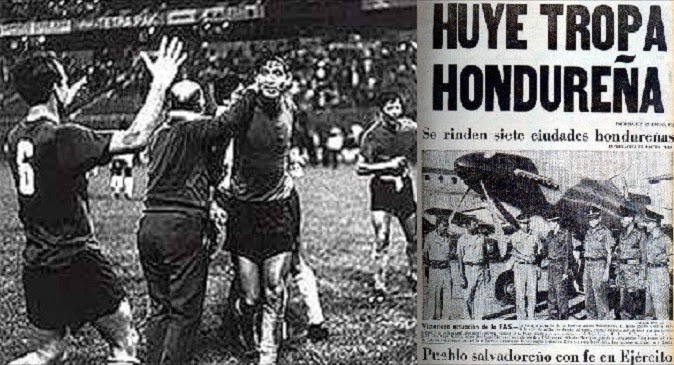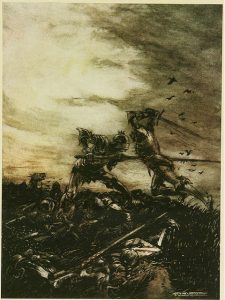
The 1969 play-off match between El Salvador and Honduras (two teams that are not only neighbors but rivals) was filled with anticipation and aggression. This playoff match would decide which nation would be attending the world cup, and which would be staying home. El Salvador and Honduras had each won one match which forced a third, and final, play-off match.1 In the prior matches, fights had broken out between fans in the street and in the stands during the game. But on the day of the final play-off, a much more significant event would take place. The game was scheduled in Mexico City: a third-party country with no bias toward either team. The day of the playoff, El Salvador dissolved all diplomatic ties with Honduras right before the match.
In the first game between the two nations, Honduras won the match 1-0 in its own capital. Some Hondurans stayed outside of the hotel that the El Salvador team had been staying at and threw rocks, set off car alarms and threw firecrackers.2 The 2nd match took place in San Salvador, where the home fans would watch their team win by a commanding score of 3-0. Before the 2nd match took place, the Honduran National team had a security force with them at all times. During the game the security at the stadium was extremely tight with lots of alcohol and weapons confiscated as a security precaution. As the Honduran national anthem played, the home team and fans were extremely disrespectful towards the players and their country. This caused some whiplash for El Salvadorians living in Honduras as their businesses were boycotted and vandalized.3 Leading up to the series of matches, the two nations were in a deep dispute over land reform and immigration. El Salvador was sending its poorest citizens into Honduras so the wealthy could maintain their land.4 El Salvador had a much bigger population than Honduras. Honduras had a population of about 2 million, where as El Salvador had a population of almost 4 million.5

However, they had a significantly smaller amount of land which forced more than 275,000 El Salvadorians to flee into Honduras, causing poverty and crime.6 Honduras accused the El Salvadorians of stealing jobs from the native people of Honduras. But after the 2nd games violence, El Salvador accused Honduras of staying silent while El Salvadorians living in Honduras were raped, murdered, robbed, and oppressed. Neither side was willing to negotiate to the smallest extent, which led to tensions building up even more. In the final match between the two teams, El Salvador won the game in overtime with the score of three to two.7 This caused numerous Salvadorians to be killed in Honduras.8
On July 14th, 1969, almost 3 weeks after the final playoff game, El Salvador bombed targets inside of Honduras. They crippled Honduras by attacking their main airport which left them unable to react to the attack at optimal speed.9 El Salvador then attacked from the ground by marching through the two main roads that connect the countries. Only one day later, the El Salvadorian army had pushed Honduras back over 8 kilometers. The El Salvadorian Army continued to make steady progress. They were nearing the capital city of Honduras, Tegucigalpa, when Honduras finally pushed back. The Honduran Air Force attacked Llopango base. The bombers eventually progressed to Acajutla port, which was important because it was home to El Salvadorian oil refineries. Later that evening huge smoke clouds covered the coast as the the oil refineries were bombed.10
Fearing that the nearing El Salvadorian army would overtake the capital, Honduras called the Organization of American States for help. The Organization of American States (OAS) had an urgent meeting on the evening of July 15th and called for El Salvador to withdraw its troops from Honduras ensuring that its people living in Honduras would not be harmed.11 El Salvador refused, demanding reparations be paid to them and their citizens. El Salvador attempted to further the attack the capital city, but they were unable to proceed with the attack. The previous strike on their oil refineries had destroyed their line of fuels and supplies and they no longer had supplies arriving every other day. Somoza Debayle, the dictator of Nicaragua was also helping Hondurans by arming them with weapons and providing ammunition. The OAS worked night and day in order to provide a cease-fire that would please both parties. Finally, on the night of July 18th, a ceasefire was arranged and became effective two days later.12
Although the cease-fire had been called, El Salvador refused to leave Honduras. They stayed until they were threatened by the OAS with economic sanctions against them. The El Salvador government finally withdrew troops on August 2, 1969. The aftermath of the 100-hour war was anything but slim. More than 2000 civilians were killed, with more than 100,000 immigrants displaced.13 Although they were no longer at war with each other, these two nations peace treaty only came into force on December 10, 1980.14
- Paul Joseph, The SAGE Encyclopedia of War: Social Science Perspectives, 2017 s.v . “Soccer War.” ↵
- Hatcher Graham, Salem Press Encyclopedia, 2013, s.v “Soccer War.” ↵
- Steve C. Ropp, 1982, “The War of the Dispossessed: Honduras and El Salvador, 1969. Thomas P. Anderson.” The Hispanic American Historical Review, no. 2: 296. JSTOR Journals, EBSCOhost (accessed February 5, 2018). ↵
- Richter, Ernesto, John Beverly, Bob Dash, and Irma Fernandez Dash. “Social Classes, Accumulation, and the Crisis of “Overpopulation” in El Salvador” Latin American Perspectives, 7, 1980 ↵
- Ernesto Richter, John Beverly, Bob Dash, and Irma Fernandez Dash. “Social Classes, Accumulation, and the Crisis of “Overpopulation” in El Salvador”, Latin American Perspectives, 7, 1980. ↵
- Charles Clements, Witness to War: an American Doctor in El Salvador (New York; Bantam Book, 1984). ↵
- Hatcher Graham, Salem Press Encyclopedia, 2013, s.v “Soccer War.” ↵
- Charles Clements, Witness to War: an American Doctor in El Salvador (New York; Bantam Book, 1984). ↵
- Charles Clements, Witness to War: an American Doctor in El Salvador (New York; Bantam Book, 1984). ↵
- Charles Clements, Witness to War: an American Doctor in El Salvador (New York; Bantam Book, 1984). ↵
- Charles Clements, Witness to War: an American Doctor in El Salvador (New York; Bantam Book, 1984). ↵
- Charles Clements, Witness to War: an American Doctor in El Salvador (New York; Bantam Book, 1984). ↵
- Charles, Clements, Witness to War: an American Doctor in El Salvador (New York; Bantam Book, 1984). ↵
- Charles Clements, Witness to War: an American Doctor in El Salvador (New York; Bantam Book, 1984); and United Nations -Treaties Series, General Peace Treaty Between the Republics of El Salvador and Honduras, 1980, https://peacemaker.un.org/sites/peacemaker.un.org/files/HN-SV_801030_GeneralTreatyOfPeaceElSalvadorHonduras.pdf. ↵



106 comments
Madelynn Vasquez
I think its interesting to learn about these types of pivotal moments in history, because I would have never known about this unless I had read this article. It makes me wonder how censored we are to not know about the history of other countries, even if it is small details here and there, however that’s a different story for another day. To know that this war started because of a soccer match is shocking because it really shows the dynamics of political climate between two countries and something as small as a soccer match can lead to something as big as a war and the loss of thousands of peoples.
Thiffany Yeupell
What I find concerning is how the playoff game was still played, even though the diplomatic ties had been cut by El Salvador. I would imagine the world cup organization would have to take some responsibility for the escalation of the conflict between El Salvador and Honduras, given how intense the people of the two nations have reacted to one another in the past. But then again, it could be chalked up to being a ‘rivalry’ and many may not have expected for such consequences to occur. However, for diplomatic ties to be cut shortly before the match, I would hope that postponement would have been an option, for that alone seems to be a major red flag (but hindsight is 20/20). But for all the damages and lives lost, maybe such precautions would be advisable for the future of the world cup and the ensuing rival countries it may deal with it.
Shriji Lalji
It is astonishing how the political climate of a nation permeates the air and infects its citizens to act even more severely. This could be a healthy rivalry in sports, however due to the political unrest of that time it turns to a violent competition. Throughout history when politics and sports combine there is often scandal. For example the Russians doping scandal, but they are not the only ones, many countries have been suspended throughout the years for breaking the rules. Most of the time competition gets the best of us, especially when involving our native countries. In this case the two countries were already competing for better land and policy prior to the games. Adding sports to the mix just takes it over the top.
Ariana Melendez
This article was very informative, yet shocking to me. As a Salvadorian, I didn’t know the history behind the rivalry with Honduras. I heard about the soccer match, but never knew it was intense enough to cause a war between El Salvador and Honduras. It is also sad to know that rather than helping each other, the two smallest countries in Central America turned their backs on each other because of soccer.
Savannah Alcazar
It is preposterous the way some fans react to sports. In this case, 2,000 civilians lost their lives due to a game? I have been involved in athletics since I can remember, and I cannot imagine a rivalry causing a literal war! That was not where I saw this going; I think the title is extremely fitting.
The first paragraph was fast paced and built anticipation. Had you considered starting the article with a scene to set the tone for the reader?
Roberto Rodriguez
It is always really interesting to see how much passion and emotion nations put into sports, the steroid use of the Russians during the Olympic Games comes immediately to my mind. It is horrible to hear that in this case the emotion expressed was to the extreme and it was violence. I cannot imagine how something that seems so trivial to some (myself included) turned into a war, it is really sad to see violence especially considering that the outcome of a soccer match lead up to it. Regardless whether it was the last straw, it is still somber.
Nicholas Robitille
I am unpleasantly surprised that such a horrible series of events stemmed from a game with a secondary goal of coring points and a primary goal of having fun. Sometimes the human race stops fighting during one of the worst wars in order to play soccer, and sometimes the human race plays soccer and, in a fit of unsportsmanlike rage, starts warring with each other. This article truly shows how excessive competition can lead to animosity, and, in the end, violence. An entire massacre was started based off of a sports feud. I hope that we stray from laying so much anger on an entertainment based sport in the future.
Octaviano Ibarra
Of all the sports I think most can agree that soccer has some of the most energetic and passionate fanbases and this huge rivalry really proves just that. Anytime you go to a soccer game there will 100% be many fans with their faces painted or carrying a flag representing their country or team. This rivalry is also a sad one in how extreme the fans showed their love for their teams/country.
Marco Monte de Oca
Passion for sports is well known, but passion for soccer in Central America, is even bigger. The countries in Central America truly breathe soccer, their lives revolve around the sport. I had no idea, before reading this article, that soccer caused a war between two countries. The riots that were going on and the fights on the street increased the tension and hatred so much. The fact that both teams needed security in order to try and stay safe tells the whole stories as to how crazy this was for each country.
Juan Arceo
This article truly brought a different meaning to the definition of a rivalry game. I know that here have been instances in which games have led to fights during the match or a few minor altercations but I have never heard of a war occurring/happening due to a soccer match such as in the case of El Salvador vs. Honduras. It’s unfortunate that a war actually took place between these 2 nations and we can only hope that another altercation like this never occurs again…